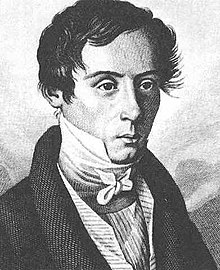Augustin Fresnel
| Augustin-Jean Fresnel | |
|---|---|

Augustin-Jean Fresnel
|
|
| Born |
10 May 1788 Broglie, Kingdom of France (now Eure, France) |
| Died | 14 July 1827 (aged 39) Ville-d'Avray, Kingdom of France (now Hauts-de-Seine, France) |
| Residence | France |
| Nationality | French |
| Fields | physics, engineering |
| Alma mater |
École Polytechnique École des Ponts et Chaussées |
| Known for |
Wave optics Fresnel equations Fresnel diffraction Fresnel lens |
| Notable awards | Rumford Medal (1824) |
Augustin-Jean Fresnel (/freɪˈnɛl/ fray-NEL; French: [ɔ.ɡy.stɛ̃ ʒɑ̃ fʁɛ.nɛl]; 10 May 1788 – 14 July 1827), was a French engineer and physicist who contributed significantly to the establishment of the theory of wave optics. Fresnel studied the behaviour of light both theoretically and experimentally.
He is perhaps best known as the inventor of the Fresnel lens, first adopted in lighthouses while he was a French commissioner of lighthouses, and found in many applications today. His Fresnel equations on waves and reflectivity also form the basis for many applications in computer graphics today — for instance, the rendering of water.
Fresnel was the son of an architect, born at Broglie (in present-day Eure). He received a rigorous Catholic upbringing from his parents, who were involved in the Jansenist movement. His early progress in learning was slow, and he still could not read when he was eight years old. At thirteen he entered the École Centrale in Caen, and at sixteen and a half the École Polytechnique, where he acquitted himself with distinction. From there he went to the École des Ponts et Chaussées.
...
Wikipedia
